Trump’s Approval Rating Higher Than Obama’s at This Juncture
A startling statistic that hides a more comforting reality.
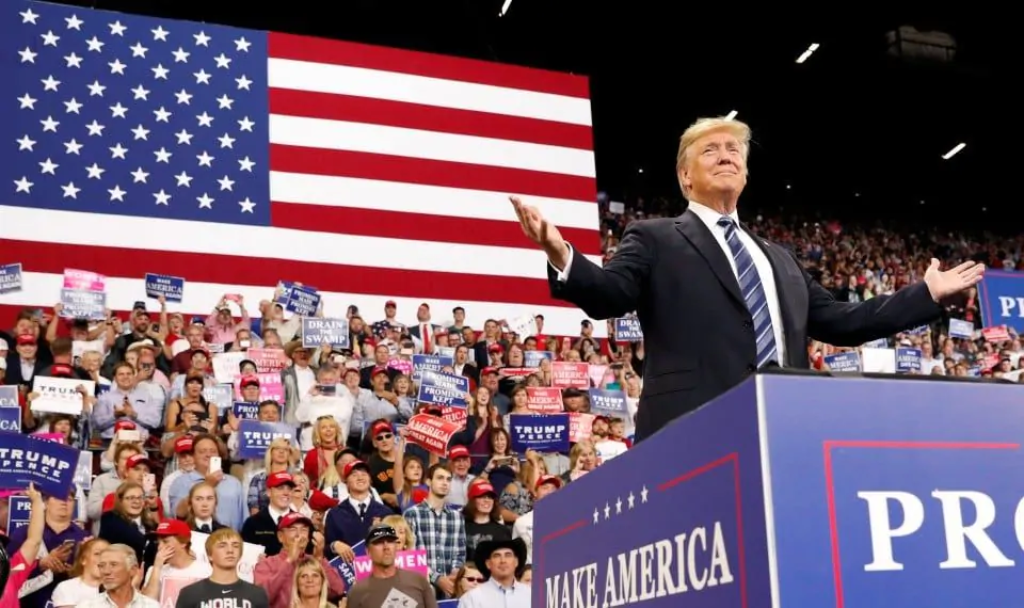
The news overnight that the whistleblower case against President Trump involves Ukraine, coupled with Trump lawyer Rudy Guiliani sought to have the Ukrainian government investigate Joe Biden, should be troubling even for Trump supporters. Doug Mataconis has a post on that set to publish. I must confess, I’m still trying to wrap my head around the legal issues.
This latest scandal comes as Newsweek alerts us that “DONALD TRUMP’S APPROVAL RATING SURPASSES OBAMA’S, NOT JUST ON RASMUSSEN REPORTS.”
President Donald Trump’s job approval rating this week averaged across major polls surpassed that of his predecessor President Barack Obama at the same time eight years ago, giving some actual good news to Trump who is known to cite only conservative-leaning polls to bolster his image.
Trump’s approval rating on Wednesday was 44.3 percent, according to a Real Clear Politics average of more than a half-dozen major polls. That is higher than Obama’s average approval rating of 43.9 percent on September 18, 2011, by the same measure.
The 45th president’s average approval rating surpassed that of his predecessor on Monday and stayed on top for the next two days. Trump’s average approval rating on Monday was 44.1 percent compared to Obama’s 43.9 percent on September 16, 2011, and 44 percent on Tuesday compared to Obama’s 43.8 percent on September 17, 2011.
At first glance, this is surprising, indeed. Looking into the numbers, though, we see that, not only does Trump remain substantially underwater (his disapproval rating is 53.2 percent) but he’s not doing particularly well even by his own standard:
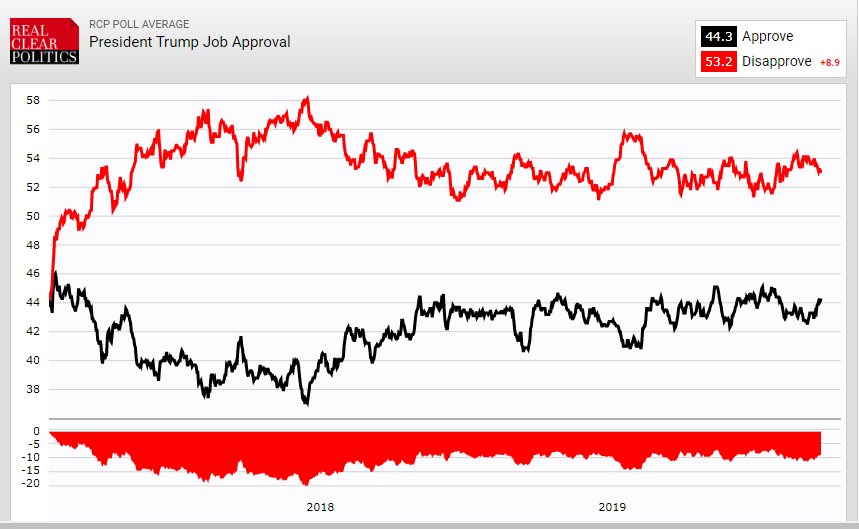
As you can see, while he’s nowhere near his historic lows, he’s had higher approval ratings at multiple times, including recently.
Thus, the comparison must have more to do with how Obama was doing at this juncture. And, indeed:
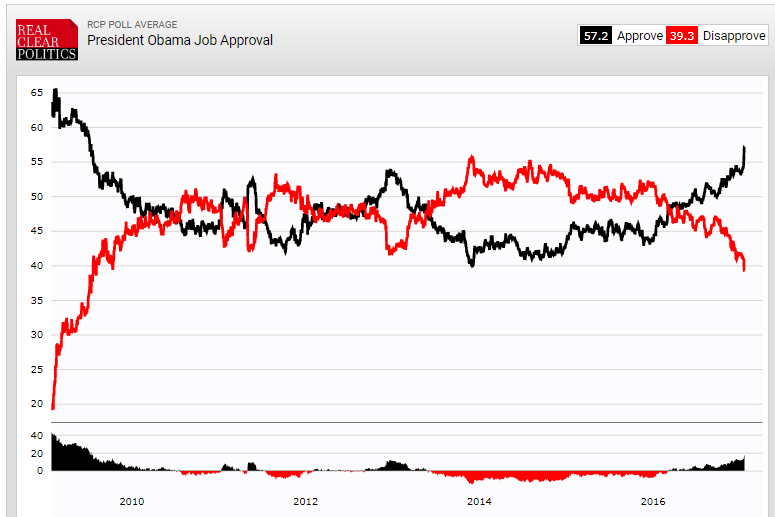
It’s a bit hard to see in this static capture but this period in 2011 and late November 2013 are the low water marks of Obama approval.
Looking back at our September 2011 archives, it’s easy to see why. There was bad economic news, the Solyndra and Fast and Furious brouhahas were unwinding, a government shutdown fight was ending, and the Republican race for 2012 was underway.
Presumably, Newsweek wants us to remember that Obama went on to be easily re-elected and think that Trump could do the same. And it’s certainly possible. But these ratings were short-lived blips for Obama, who was generally as popular as a President is going to be in our polarized era. Trump, by contrast, has been underwater for essentially his entire presidency and appears likely to stay that way.

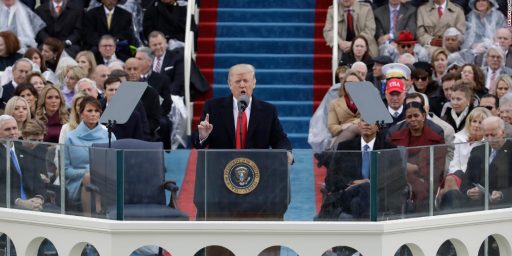
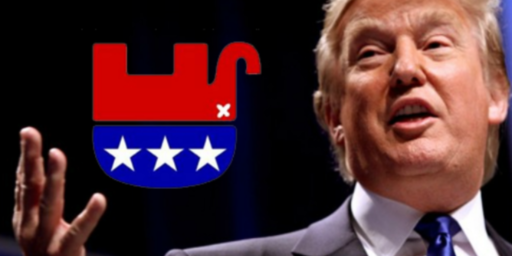
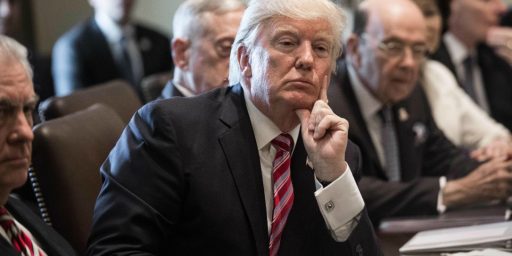
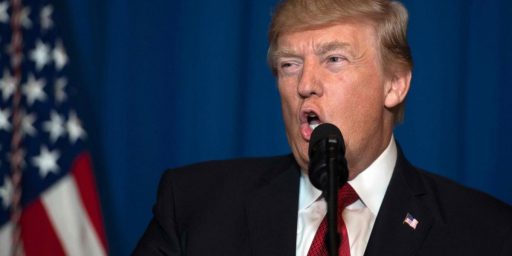
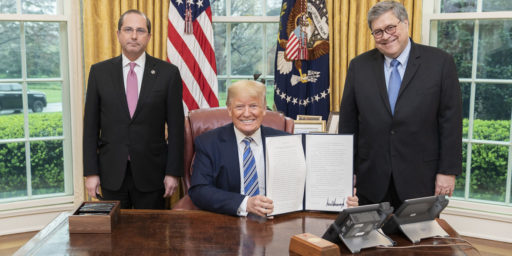
The other major difference can also be seen in the respective charts that you post — namely the fact that Obama’s job approval had varied in the time before the relevant time period in his Presidency and that there was a time when his job approval was 50% or higher.
Trump, by contrast, has been upside down in job approval since basically the beginning of his Presidency and its unlikely that it will change between now and November 3rd, 2020
Rove and W ran a permanent campaign. The administration was in campaign mode full time and Rove sat in on cabinet meetings to advise on the political implications of any decision. Perhaps partly in reaction Obama seemed to have a governing mode and a campaign mode. He was aware the electorate have a short memory and would get political a year or less before the election. He knew it was what he did within six months of the election that mattered politically. He was also confident in his campaign and his own political skills to be able to pull up his ratings.
Trump seems to not have a governing mode. Holding rallies seems to be his one trick. And he seems to be panicking as the election approaches.
President Trump is more persistently unpopular than any president in history. He has a definite floor of unpopularity of about 51%—almost exactly what it was among voters on election day. But he also has a floor of popularity of about 35%. His present approval rating 9 points over that floor.
If you look only at President Obama’s approval and disapproval during his presidency (the graph above shows more) he had a floor of disapproval of about 41% and a floor of approval of about 39%. Both are better than Trump’s.
Long story short: the only poll that really matters it the one on election day.
Oh please his average is like 44 and he has never been anywhere near 50 in any poll other than Rasmussen. Every now and then Obama would drop a few points, but there is no way you can compare the two. For one thing the number of people who hate Trump and view him very unfavorably is higher than anything Obama ever saw.
The big difference is that the economy was still recovering under Obama. Had he had Trump’s economic numbers, it would have looked quite different.
This reminds me of the recent post on fact checking in the Age of Trump: no number of pinocchios really captures the reality of someone who lies constantly. And comparing opinion polls from previous presidents cannot really capture the reality of people who will never change their minds about Trump.
@Dave Schuler:
Actually polls determine who hits their fundraising goals and who doesn’t. Who makes the debate stage and who doesn’t. Who gets media attention and who doesn’t. They can also influence who gets in and who stays out (bye bye DeBlasio).
I have never in my politics-obsessed life seen any politician so utterly fixed at ~42% as Trump. The polling gap has not budged significantly in over a year. Polling is telling us that many more people ‘strongly oppose’ Trump – 43% to 26% who strongly support him. BTW that ‘strongly oppose’ number had 39% as its low, and 49% as its high. The highest ‘strongly support’ was 35% all the way back in February 2017. At no point has ‘strongly support’ come anywhere close to equalling ‘strongly oppose.’
This polling tells us that Trump’s floor is also his ceiling. That is useful data, and it has an impact in the day-to-day of politics, in foreign policy, and of course in how public-facing corporations treat Trump. And God knows it scares the orange twat in the White House.
So many talk about what a nail-biter next year’s election might be…but what if the dislike of Trump causes him to lose in a blowout, what if more people are repulsed by him than we realize…what will Republicans do if he drags them down with him…
@Dave Schuler: @michael reynolds: The expression “The only poll that counts is the one on Election Day” is nothing more than a lazy cliche people use to dismiss the importance of polls, which are in general quite useful. It’s something that losing candidates say all the time. It’s based partly on a semantic game—you could say the election is the only poll that “counts” in the sense that it’s the only one that makes the final determination as to who wins. But what’s being implied is that surveys somehow give no useful or accurate information—which is clearly not the case.
@Dave Schuler:
With widespread voter disenfranchisement in multiple states, the much discussed at OTB skew of the electoral college, and incumbent-encouraged foreign interference, I don’t know that Election Day will reflect the Public Will either.
@An Interested Party:
This has more of a chance of happening than I think many Republicans realize. One of the more interesting nuggets that was in the ProPublica profile of Brad Parscale was the fact that the RNC no longer is providing information on the popularity of the president in voter scores to candidates and campaigns.
The effect of this is that a lot of Republicans are essentially flying blind and have to guess at how popular (or unpopular) Trump is in their district. While there are certain indicators that a Congressional candidate can pay attention to, the danger is that they might overestimate his popularity based on a handful of vocal supporters in the district.
If the Trump campaign has this data and is refusing to share it with candidates, there’s only one of two possible explanations. Either the numbers are so bad that they don’t want thus-far loyal Republicans begin to distance themselves, or, the numbers are being withheld as a form of psychological blackmail. In a campaign, information is power and the idea that candidates aren’t being provided with information that could be important to their campaigns is just so unusual I can’t get over it.